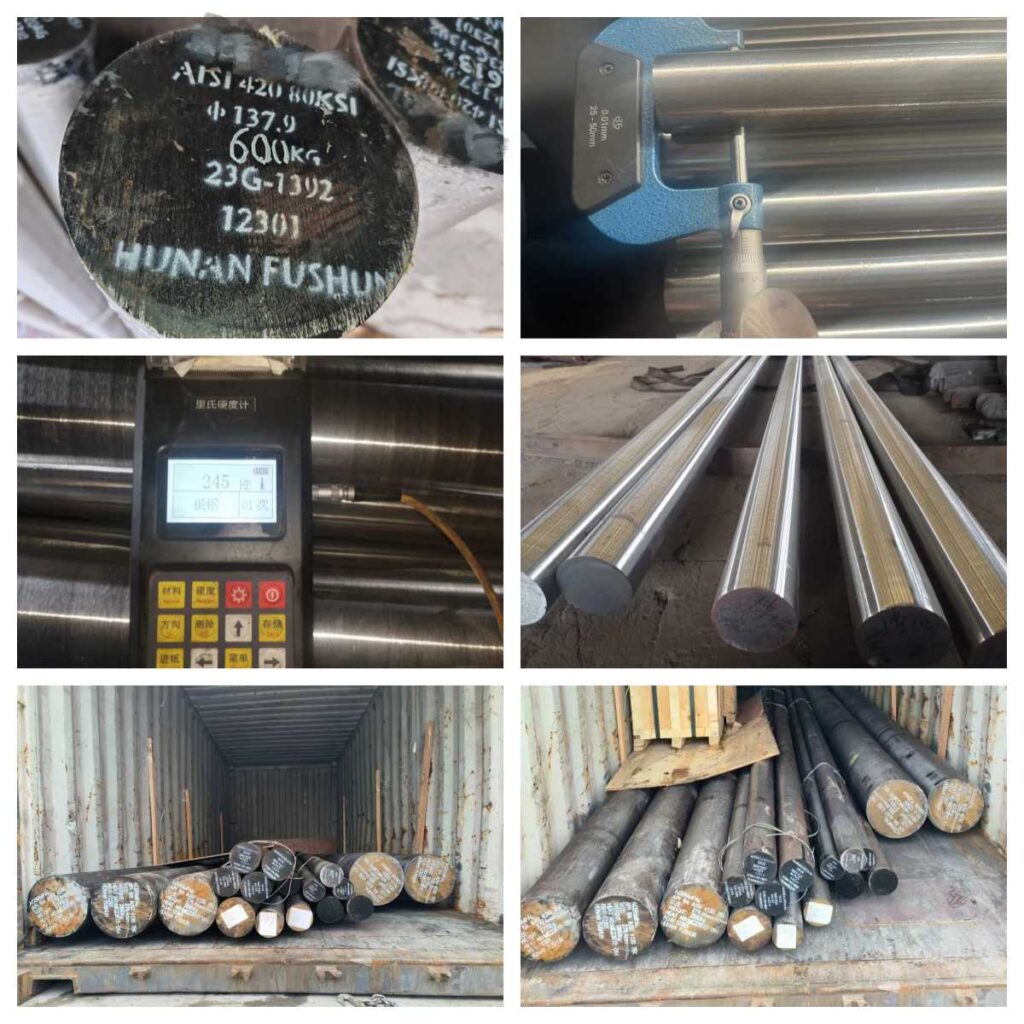Quality Satisfaction: FUSHUN METAL Delivers Heat-Treated Forged Round Bars to Colombian Customer Over Lunar New Year
During the Chinese New Year holiday, FUSHUN METAL successfully delivered 15 tons of 4130 forged round bars and 5 tons of 420 forged round bars to our esteemed customer in Colombia. All forged round bars underwent heat treatment to ensure optimal mechanical properties. We are delighted that our customer expressed satisfaction with the quality of our products even during the festive season. This achievement reflects our unwavering commitment to delivering high-quality materials and excellent service to our clients worldwide.
DESCRIPTION OF GOODS:Forged Steel Bars
| PO No | Item No | Quality Standard | Steel Grade | HS CODE | Dimensions(mm) | Quantity | ||||
| Diameter | Length | PCS | PACKAGE | Net Weight (KGS) | Gross Weight(KGS) | |||||
| 12301 | 1 |
API 6A 21st edition. |
AISI 4130
|
7228409000 | 127 | 5835 | 1 | 1 | 600 | 600 |
| 12301 | 2 | 7228409000 | 127 | 5830 | 1 | 1 | 600 | 600 | ||
| 12301 | 3 | 7228409000 | 177.8 | 5825 | 1 | 1 | 1180 | 1180 | ||
| 12301 | 4 | 7228409000 | 279.4 | 5690 | 1 | 1 | 2770 | 2770 | ||
| 12301 | 5 | 7228409000 | 279.4 | 5835 | 1 | 1 | 2850 | 2850 | ||
| 12301 | 6 | 7228409000 | 279.4 | 5285 | 1 | 1 | 2580 | 2580 | ||
| 12301 | 7 | 7228409000 | 330.2 | 4600 | 1 | 1 | 3115 | 3115 | ||
| 12301 | 8 | 7228409000 | 355.6 | 4790 | 1 | 1 | 3740 | 3740 | ||
| 12301 | 9 | 7228409000 | 584.2 | 180 | 3 | 1 | 1155 | 1155 | ||
| 12301 | 10 | 7228409000 | 685.8 | 180 | 3 | 1 | 1590 | 1590 | ||
| 12301 | 11 | / | AISI 420 80KSI | 7222309000 | 114.3 | 5270 | 1 | 1 | 418 | 418 |
| 12301 | 12 | 7222309000 | 114.3 | 5285 | 1 | 420 | 420 | |||
| 12301 | 13 | 7222309000 | 114.3 | 5290 | 1 | 420 | 420 | |||
| 12301 | 14 | 7222309000 | 137.9 | 5320 | 1 | 1 | 613 | 613 | ||
| 12301 | 15 | 7222309000 | 137.9 | 5304 | 1 | 600 | 600 | |||
| 12301 | 16 | 7222309000 | 137.9 | 5296 | 1 | 598 | 598 | |||
| 12302 | 17 | 7222309000 | 137.9 | 5093 | 1 | 1 | 591 | 591 | ||
| 12302 | 18 | 7222309000 | 137.9 | 5250 | 1 | 609 | 609 | |||
| 12302 | 19 | 7222309000 | 137.9 | 5204 | 1 | 604 | 604 | |||
| 12302 | 20 | 7222309000 | 137.9 | 5085 | 1 | 590 | 590 | |||
| TOTAL | 24 | 13 | 25643 | 25643 | ||||||
The Application of Steel in the Petroleum Industry: Understanding 4130, 420, Characteristics, and Heat Treatment
The petroleum industry relies heavily on steel for various applications, with commonly used grades including 4130 and 420. Both chromium-molybdenum (CrMo) alloy steel and stainless steel offer unique characteristics and drawbacks.
Characteristics of CrMo Alloy Steel (e.g., 4130):
– Strength: CrMo alloy steel, such as 4130, boasts excellent strength and toughness, making it ideal for components subjected to high stress and impact.
– Weldability: It exhibits good weldability, facilitating ease of fabrication and repair.
– Heat Treatment: 4130 undergoes quenching and tempering for optimal mechanical properties, enhancing hardness and durability.
Disadvantages of CrMo Alloy Steel:
– Corrosion Resistance: While CrMo alloy steel offers decent corrosion resistance, it may not suffice for highly corrosive environments without additional protection.
Characteristics of Stainless Steel (e.g., 420):
– Corrosion Resistance: Stainless steel, like 420, offers superior corrosion resistance, making it suitable for applications in harsh environments, including the petroleum industry.
– Strength: It possesses moderate strength, sufficient for many structural and mechanical components.
– Heat Treatment: Heat treatment of 420 stainless steel involves annealing, quenching, and tempering to achieve desired hardness and toughness.
Disadvantages of Stainless Steel:
– Cost: Stainless steel tends to be more expensive than alloy steel, affecting overall project costs.
– Machinability: Depending on the grade, stainless steel may exhibit lower machinability compared to some alloy steels, necessitating appropriate tooling and techniques.
Ensuring Performance After Heat Treatment:
– Controlled Processes: Maintaining precise temperature and time parameters during heat treatment is crucial for achieving desired material properties.
– Quenching Medium: Selection of the appropriate quenching medium ensures uniform cooling rates, minimizing distortion and achieving consistent hardness.
– Post-Treatment Inspection: Thorough inspection after heat treatment helps identify any defects or deviations from specifications, ensuring product quality and performance.
In conclusion, steel plays a vital role in the petroleum industry, with grades like 4130 and 420 offering distinct advantages and considerations. Understanding their characteristics and employing proper heat treatment techniques are essential for ensuring optimal performance and reliability in demanding oilfield applications.

